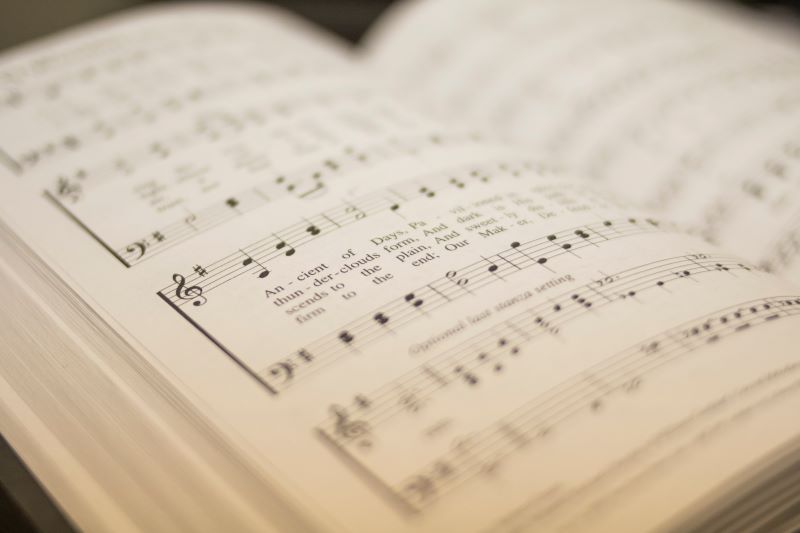My dad, in a longstanding tradition of fatherhood, sang silly songs. Waiting for the last dinner dish to arrive at the table, he’d sing, “Here we sit like birds in the wilderness…waiting for our food.” On Tuesdays, which was my sister Suzy’s day (Suz-day) in our house, he sang, “Susie, little Susie, now what is the news…” Whenever “Stars and Stripes Forever” started up, he’d sing, “Be kind to your web-footed friend, for a duck may be somebody’s mother…”
I haven’t heard my dad sing these songs in at least twenty years, but they are part of my mental playlist. Songs stick in our heads. We all have memorized countless sets of lyrics without even trying, simply because we learned them set to music.
The book of Psalms is made up entirely of songs, which means they ought to be easier to memorize. But the obvious problem is that, when I open the book of Psalms, tunes don’t start playing—like a musical Hallmark card. There are just words, black and white pages. Don’t get me wrong: I love words. But without some musical assistance, they aren’t likely to stick in my head.
The original melodies may be lost to us, but that shouldn’t stop us from finding new ones. And, honestly, there are terabytes of tunes to be had on YouTube. But for nonmusicians like me, many of these newer songs aren’t very singable. I’m on the hunt for singable versions of the songs of ascent, and as we work through the collection, I’ll offer what I’ve found. If you know others, please share!
The original melodies may be lost to us, but that shouldn’t stop us from finding new ones.
Speaking of the psalms as songs, they aren’t all the same kind of song. You know this if you’ve spent any time in the book: “Why, LORD, do you stand far off?” and “Sing to the LORD a new song!” are clearly not in the same category. The psalms are classified in a handful of ways, though these categories aren’t iron-clad. Like every artist, the psalmists adapt forms for their own purposes. Scholars quibble over the exact categories, but there are at least four that most people agree on:
- Lament. Believe it or not, this is the most frequent kind of psalm. Roughly one-third of the psalms are prayers for help and/or complaints that God seems not to be listening. Most of these are individualized, but a few reflect the cry of an entire community (see, for example, Psalms 12 and 44).*
- Hymn / Song of praise. These songs (roughly one-fifth of the Psalter) begin with an invitation to praise God, such as, “Bless the LORD!” or “Shout to the LORD!” What follows are the reasons God deserves such praise—for being Creator, King, covenant God, and so on. See, for example, the very short and sweet Psalm 117.
- Thanksgiving. Psalms of thanksgiving are complementary to the lament songs, which ask for God to help. When God responds, the psalmists offer thanks for the deliverance. See Psalms 40 and 107 for examples.
- Royal psalms. These songs all explicitly refer to the king and events surrounding kingship, such as coronation (Psalms 2 and 110), marriage (Psalm 45), and warfare (Psalms 18 and 20). David is the quintessential Old Testament king in Israel, but his kingship is based on Yahweh’s cosmic kingship.
Knowing what category each psalm fits into isn’t essential to understanding the psalm’s meaning, but it might broaden your perspective on the psalmist’s frame of mind and purpose for crafting the song.
* An excellent, readable resource on biblical lament is Dark Clouds, Deep Mercy: Discovering the Grace of Lament, by my college forensics buddy Mark Vroegop.



I don’t mind chiming in with this title, which I have read. Michael Card is a thoughtful, erudite and prolific writer and singer-songwriter. We need more authentic avenues of Lament!
https://www.christianbook.com/sacred-sorrow-reaching-lost-language-lament/michael-card/9781576836675/pd/36675?utm_source=google&kw=127983375810&mt=&dv=c&event=PPCSRC&p=1186432&gclid=Cj0KCQjw-daUBhCIARIsALbkjSYrWvYbWGSg-HcGMRRiiSj4qRiaM7-tJ_YB14gtP6fR9Ewd7sM_BhAaAuu6EALw_wcB
Michael Card is one of my favorites, Terry! Thanks for sharing this resource.
Hi, his name is Mark “Vroegop”.
Caleb! Mea culpa! Of course it is! And I consider myself an editor and proofreader (and a friend of Mark)! Gah. Thanks for catching that, and if you know Mark, ask him sometime about oil-covered glasses and the Exxon Valdez. 🙂